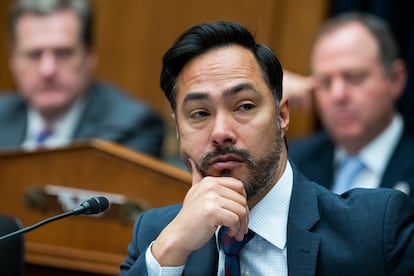Democrats reject Republican calls to declare a war against cartels in Mexico
A new resolution being put forth by Representative Joaquin Castro — to which EL PAÍS has had access — rejects the possibility of U.S. military intervention on Mexican soil

The U.S. House of Representatives “respects the sovereignty of Mexico” and “rejects the use of military force by the United States against entities based in Mexico, including transnational criminal organizations.” Those are the two central points of a resolution being put forth by Democratic Rep. Joaquin Castro as a direct response to calls from the hard-line wing of the Republican Party for the U.S. military to intervene in Mexican territory against drug cartels. “Over the last several months, Americans have seen an alarming rise in reckless remarks that threaten to normalize the idea of invading Mexico,” said Castro, who sent a copy of the resolution to EL PAÍS ahead of presenting it on the floor.
“War with Mexico would cause devastating loss of life and would be disastrous for millions of Mexicans and Americans living in Mexico, as well as those in the U.S. whose livelihoods depend on legitimate cross-border trade,” said the lawmaker from Texas. Castro explained that his proposal is intended to send a “strong message” that the House “does not support dangerous calls for war at our southern border,” and he called on Republicans who do not support the idea of military intervention against the cartels without authorization from the Mexican government to join him.
The resolution drafted by Castro — the ranking Democrat on the Subcommittee on the Western Hemisphere — has the backing of a score of legislators who have already spoken out against the bellicose discourse of some Republicans when talking about combatting drug trafficking into the U.S. Chuy Garcia of Illinois, Nydia Velazquez of New York and Raul Grijalva of Arizona are some of the lawmakers who support the proposal.
“If we’ve learned anything from the last twenty years, it’s that Congress should only authorize military force as an absolute last resort when we have exhausted all other tools at our disposal in responding to international conflict,” said California Rep. Barbara Lee. “Mexican cartels pose a real threat to both of our nations, but the solution lies in expanding our cooperation with Mexico, not treating them like an enemy or military target. Doing so would only cost needless lives and exacerbate conflict,” she added. In order to pass, the resolution, which cites principles of international law such as the Charter of the United Nations and the Organization of American States, would need the support of the Republican majority in the House.
The resolution comes amid heightened tensions between members of the most conservative sectors of the Republican Party and the government of Andrés Manuel López Obrador. It also comes as three high-ranking members of Joe Biden’s administration — Secretary of State Antony Blinken, Secretary of Homeland Security Alejandro Mayorkas and Attorney General Merrick Garland — visit Mexico City to discuss a strategy against the fentanyl crisis and the influx of migrants.
Since late last year, several Republican leaders have revived the idea that López Obrador’s security policy has failed and that the United States should intervene militarily against organized crime groups, giving them the same treatment as terrorist organizations. In recent months, the Mexican president and several conservative legislators from the U.S. have exchanged reproaches. In the latest clash, López Obrador said last week that those who supported the idea of U.S. intervention in his country were “very ridiculous” and insisted that such a move would be a violation of international law.
The proposal, however, has gained popularity among various sectors of the GOP. Seven of eight presidential hopefuls have come out in favor of U.S. military action against the cartels, including former president Donald Trump and Florida Governor Ron de Santis, both of whom have a tough stance on immigration. Ahead of next year’s elections, several Republican politicians have made Mexico’s role in the drug war and in dealing with the migration crisis a pillar of their campaigns. López Obrador, on the other hand, has said it is a crude and “politicking” electoral strategy.
In an interview with this newspaper in late July, Republican Rep. Dan Crenshaw, one of the legislators who have clashed in recent months with López Obrador, denied that his party was calling for an invasion. According to him, what his party actually proposes is military collaboration with Mexico. “López Obrador knows we’re not going to invade Mexico, that’s nonsense,” insisted Crenshaw, who is part of a congressional task force against the cartels. “I can’t believe the media, the Democrats and [López Obrador] would say something like that. Obviously, we’re going to respect Mexico’s sovereignty,” added the lawmaker from Texas, who insisted that his only intention was to “help Mexico.”
Last week, the Republican majority in the House approved a $60 million cut in aid to Mexico, in a new escalation of tensions. López Obrador has insisted that his relationship with the United States is in good health and that diplomatic channels of cooperation are armored, despite mounting pressure from Republicans.
All in all, Mexico is once again at the crossroads between Democrats and Republicans, with the 2024 votes as a backdrop. Castro’s proposal seeks to make the “invasion” point clear once and for all and recognize that the United States cannot intervene without the express authorization of the Mexican and U.S. governments.
Sign up for our weekly newsletter to get more English-language news coverage from EL PAÍS USA Edition
Tu suscripción se está usando en otro dispositivo
¿Quieres añadir otro usuario a tu suscripción?
Si continúas leyendo en este dispositivo, no se podrá leer en el otro.
FlechaTu suscripción se está usando en otro dispositivo y solo puedes acceder a EL PAÍS desde un dispositivo a la vez.
Si quieres compartir tu cuenta, cambia tu suscripción a la modalidad Premium, así podrás añadir otro usuario. Cada uno accederá con su propia cuenta de email, lo que os permitirá personalizar vuestra experiencia en EL PAÍS.
¿Tienes una suscripción de empresa? Accede aquí para contratar más cuentas.
En el caso de no saber quién está usando tu cuenta, te recomendamos cambiar tu contraseña aquí.
Si decides continuar compartiendo tu cuenta, este mensaje se mostrará en tu dispositivo y en el de la otra persona que está usando tu cuenta de forma indefinida, afectando a tu experiencia de lectura. Puedes consultar aquí los términos y condiciones de la suscripción digital.









































